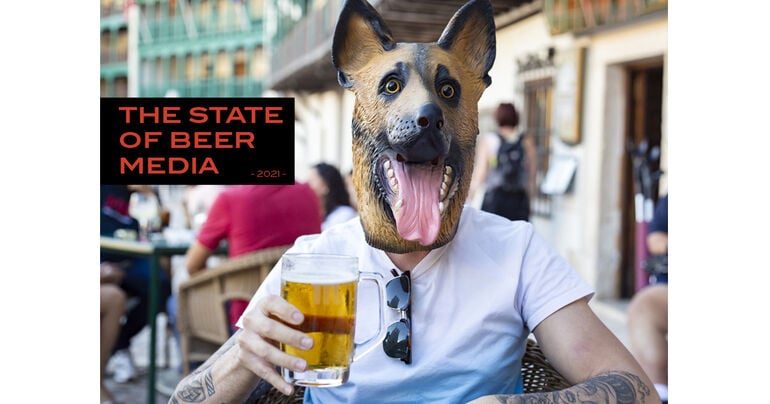Start 14-Day Trial Subscription
*No credit card required

The State of Beer Media
The trends in craft beer during 2020 were very much influenced by the COVID-19 pandemic and that included the media coverage of craft brewing. Online publications trended towards subscription-based platforms. Regional print beer publications, dependent upon advertising and free distribution, all but disappeared. A new way of delivering content to craft beer lovers, meanwhile, emerged in the form of virtual festivals.
One of the biggest media stories of 2020 was the announcement by Brewbound.com that it would require a substantial annual subscription from those who wanted to read its voluminous daily content on craft brewing as well as content about the macro beer industry. Once travel and social gatherings were curtailed by the pandemic, Brewbound’s industry-focused seminars, a significant portion of the focus at the company, went away and a subscription pay wall went up.
Prior to the pandemic and under normal market conditions, a paying portal was primarily the domain of high-end, trade-focused websites subscribed to by distributors and retailers. Switching to a subscription basis similar in cost to the very successful format of market newsletters was probably an option long on the table for Brewbound’s management, given the publication’s intense focus on following the industry though staff-written stories on a daily basis.
As regular readers of The Beer Connoisseur are already aware, the online magazine also launched a subscription requirement in 2020 for readers to access content that is oriented to its consumers such as blind tastings by BJCP reviewers as well as articles of consumer and trade interest.
When it comes to paid online subscriptions, Brewbound and The Beer Connoisseur were preceded by Craft Beer & Brewing, which offers online content in addition to six magazines a year. All three outlets rely on regular contributors and use some form of “free” content that encourages beer enthusiasts to choose a subscription plan.
In the past, print magazines were often a major conduit for linking consumers and brewers to their lucrative beer festivals, a model pursued by All About Beer, which hosted World Beer Festivals, and by BeerAdvocate, which hosted more than 70 ticketed events prior to the pandemic. Both magazines ceased publication in 2018. BeerAdvocate, however, bounced back last year in an acquisition by a longtime media rival.
Next Glass, owners of the beer ratings app Untappd.com, purchased BeerAdvocate in a deal presumably put together toward the end of 2019 that was closed before the serious nature of the pandemic and its economic impact arrived in March of 2020.
This “merger” combines the only two beer rating sites outside of RateBeer.com, owned by AB InBev. With the investment from the macro brewer, RateBeer had been growing its content by combining an app and website approach to its reviews, providing more than a “check the boxes” numerical system.
Prior to its acquisition, BeerAdvocate had failed twice to get more competitive by introducing its own app, which is an expensive undertaking, in order to gain a larger foothold in the ratings market beyond the participation generated online in more nuanced ratings compared to the app sites. Under Next Glass, the recently combined forces are continuing their respective app and online approaches, aiming to give RateBeer more competition by using a similar methodology.
The Untappd app brings the far broader reach of a “check the box” listing approach that makes it easy for beer drinkers to remember where they’ve been, what they’ve drunk and what they liked. But that is different from an actual written review from more serious beer drinkers posting online as took place at BeerAdvocate, a system led by its founders Jason and Todd Alstrom. The combination of the Untappd app feeding data to a BeerAdvocate site also featuring online reviews, which will continue to involve the BeerAdvocate founders, shows signs of both boosting editorial-type comments and reaching a broader following.
The deal will also help Next Glass and its Untappd brand when it comes to festivals by purchasing, in effect, BeerAdvocate’s Extreme Beer Fest. At the time the deal was announced prior to the pandemic, the pursuit of synergies on beer festivals was embraced by the new ownership. After the unexpected tidal wave of COVID-19 swamped the prospect of live gatherings, Untappd elected to engage the virtual beer festival concept midway in 2020. This year, a virtual festival is being undertaken through the BeerAdvocate portal, giving the concept its most serious test to date.
Attendees of the IPA Fest in cyberspace will receive a hand-curated box containing IPAs from each geographic region in the U.S., access to tastings by staff and a guest as well as a chance to learn about the beers from participating brewers in online sessions. Pandemics have a way of bringing about permanent changes, but it remains to be seen how well the virtual approach will work, or if it’s just a stop-gap measure to keep in touch with traditional festival attendees while waiting for vaccines to establish herd immunity.
In 2020, regional newsprint publications that were a main source of beer news fell into the “no longer in circulation” mode, a change of the less progressive variety. The model of distributing in print for free failed due to pandemic shutdowns and slowdowns. Advertising from businesses dependent upon people getting out and about dried up. This left long-established and beloved favorites like the East Coast’s Ale Street News, The Growler, distributed in Minnesota, and San Diego’s West Coaster in limbo. Their websites survive, albeit without much in the way of fresh content, and it remains to be seen if these publications can bounce back once the pandemic passes.
Having survived the loss of some of its regional outlets in the Great Lakes, Rocky Mountain and Southwest regions during a major flap about a bizarre sexist monologue from now-departed co-publisher Bill Metzger in 2019, the Brewing News proved resilient during 2020. The Yankee, Mid-Atlantic and Southern Brewing News regionals continued despite the pandemic in no small part due to a well-established online presence under remaining owner Jamie Magee.
Due to longstanding commitments to an online presence, alt-newspapers continued their coverage on beer as part of a broader base of lifestyle reporting, news and commentary. That broader base combined with an online presence enabled these craft beer-interested publications to survive the pandemic compared with some of those interested solely in beer. They have also resorted to asking for contributions in the Wikipedia tradition in addition to subscriptions. The category includes Denver’s Westword and the Oregon-based Portland Mercury, among others.
With more time at home available to beer enthusiasts, it appeared that podcasts, also known as a converged medium, are picking up steam. When it comes to beer, the format had already started to imitate the broader mainstream media by focusing on current issues as well as traditional media reporting in place of how-to forums for homebrewers or video tasting sessions. (These latter podcasts were, perhaps, the first virtual “festivals.”) The converged nature of podcasts, i.e. an offshoot of some larger media organization using social media platforms for promotion, has gradually moved toward a broader presence by independent podcasters leveraging social media. This has resulted in independent followings for stand-alone brands such as The Craft Beer Channel, which is British in origin and promoted primarily through YouTube, as well as Steal This Beer.
If COVID-19 results in longer-term societal changes such as a mix of in-school and virtual learning and more telecommuting, will there be significant long-term changes in the reporting of craft beer?
Participatory ratings sites that got a boost with the merger of rivals in 2020 had already been on a long growth trajectory. They have grown steadily along with an increasing number of millennial-aged craft brewing enthusiasts brought on by the expansion of craft breweries from just over 1,500 in 2008 to over 8,000 ten years later. In this sense, RateBeer and the newly merged Untappd/BeerAdvocate reflect an existing model of potential online advertising revenue from free content generated by an ever-increasing number of participants. While that content was usually generated from all manner of drinking establishments serving draft brews prior to 2020, the numbers did not slow significantly once enthusiasts were forced to move to packaged beer consumed at home.
On the other hand, the move toward premium paid subscriptions for deeper and more considered media content online as exhibited by the publications of Brewbound, Craft Beer & Brewing and The Beer Connoisseur confirm that the original desire for timely and detailed information on the craft beer community, which helped create and sustain a traditional consumer magazine format, remains strong.
Trade publications such as the Brewers Association’s New Brewer and Zymurgy as well as the trade titles Brew Your Own and Brewer remain long-term players due to built-in readerships and advertising as well as their history. The value of this same kind of tradition did not save the two consumer magazines that disappeared in 2018 or Draft, which departed earlier. But the demand for their content may not have been as much of a problem as sticking for too long with the overhead of printing and reaching readers through the mail.
Overall, whether its ratings sites, magazine and newsprint publications, or podcasts, the pandemic has continued to accelerate the tried-and-true method of reaching a broad array of beer enthusiasts through the lower cost of electronic communication.



